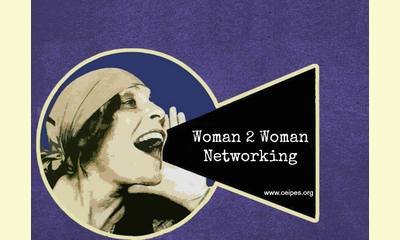|
|
Blog 'Woman 2 Woman Networking'
un articulo por Ana Afonso
Video: Interviews participants workshop Woman 2 Woman
The blog ‘Woman 2 Woman Networking’ is now active and can be found online on this page.

click on photo to enlarge
‘Woman 2 Woman Networking’ was born in the framework of a European Grundtvig workshop held in Palermo last July.
The workshop, coordinated by an international NGO named CEIPES (www.ceipes.org), convened twenty-one women from more than ten European countries and its main goal was to promote self-development and empowerment for women.
One of the main outcomes of the workshop was the ‘Woman 2 Woman Networking’ the main aim of which is “to promote women’s personal development and empowerment contributing to their full participation at all levels of life and society and in this way foster gender equality and fight gender based discrimination and violence. At the same time and as a complementary and fundamental part of our work we also aim to boost men’s awareness of masculinity and the role of patriarchal system in the creation and maintenance of gender and other inequalities.”
The network has an informal status and its main tool is the blog and the associated Facebook page (Woman2Woman Networking). The blog is meant to become a tool of sharing and learning together and soon a complaint system will be created where women can report problems and issues related to discrimination. For instance a woman can share her difficulties during a job interview given to her being a woman and ask for advice on how to deal with such kind of situation. Otherwise a woman can call out for ideas on how to react to sexism and misogynistic comments. The complaints will be analysed and posted online so that other users can reply and comment, creating in this way a network of active people who empower each other by sharing ideas and knowledge.
Another feature of the blog and Facebook page is that users can send articles and audio-visual materials to be posted online, always after critical revision from the blog managers. Finally the blog will be the platform to launch advocacy campaigns on women and gender related issues. The first advocacy event is expected to take place the 25th of November, which is the International Day for the Elimination of Violence Against Women. All those interested in joining can follow the latest updates on Facebook or directly on the blog.
|








|
DISCUSSION
Pregunta(s) relacionada(s) al artículo :
What other resources can be utilized to give women more opportunities?,
* * * * *
Comentario más reciente:
On their website, the United Nations Population Fund makes it clear that lack of access to family planning is a form of violence against women.
"Gender-based violence both reflects and reinforces inequities between men and women and compromises the health, dignity, security and autonomy of its victims. It encompasses a wide range of human rights violations, including sexual abuse of children, rape, domestic violence, sexual assault and harassment, trafficking of women and girls and several harmful traditional practices. Any one of these abuses can leave deep psychological scars, damage the health of women and girls in general, including their reproductive and sexual health, and in some instances, results in death.
Violence against women has been called "the most pervasive yet least recognized human rights abuse in the world." Accordingly, the Vienna Human Rights Conference and the Fourth World Conference on Women gave priority to this issue, which jeopardizes women's lives, bodies, psychological integrity and freedom. Violence may have profound effects – direct and indirect – on a woman's reproductive health, including:
Unwanted pregnancies and restricted access to family planning information and contraceptives
Unsafe abortion or injuries sustained during a legal abortion after an unwanted pregnancy
Complications from frequent, high-risk pregnancies and lack of follow-up care
Sexually transmitted infections, including HIV
Persistent gynaecological problems
Psychological problems
Gender-based violence also serves – by intention or effect – to perpetuate male power and control. It is sustained by a culture of silence and denial of the seriousness of the health consequences of abuse. In addition to the harm they exact on the individual level, these consequences also exact a social toll and place a heavy and unnecessary burden on health services.
UNFPA recognizes that violence against women is inextricably linked to gender-based inequalities. When women and girls are expected to be generally subservient, their behaviour in relation to their health, including reproductive health, is negatively affected at all stages of the life cycle.
UNFPA puts every effort into breaking the silence and ensuring that the voices of women are heard. At the same time, the Fund works to change the paradigm of masculinity that allows for the resolution of conflict through violence. . ... continuación.

|
|









